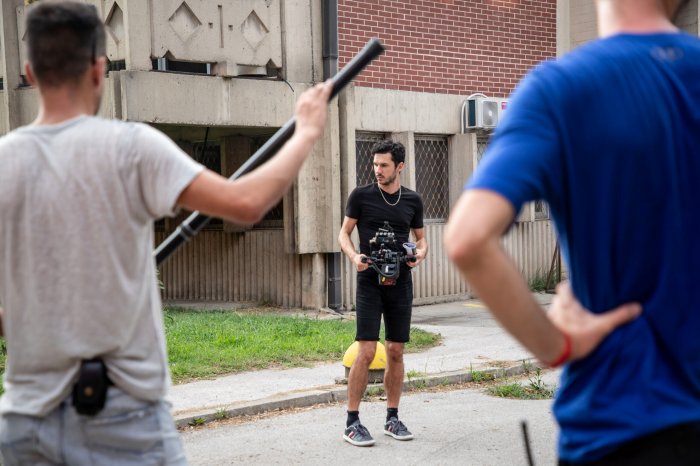GAY CITY NEWS ILLUSTRATION BY MICHAEL SHIREY
Vito Russo was a witness to Stonewall, a vivid player in the early gay rights movement that followed, the cultural historian who blew open the door of Hollywood’s closet through lectures and a groundbreaking book called “The Celluloid Closet,” a co-founder of GLAAD with other gay and lesbian writers, and a major AIDS activist while living with the then-deadly syndrome himself. When he died at 44 in 1990, the Great Hall of the Cooper Union in the East Village was filled to capacity, drawing together the diverse strands of those who loved him, worked with him, or just admired him.
Russo’s “Celluloid Closet” was turned into a tremendously illuminating and moving documentary in 1995 by Rob Epstein and Jeffrey Friedman, who won an Academy Award for “The Times of Harvey Milk.” Now, in “Vito” from HBO, Jeffrey Schwarz brings us the story of Russo himself, beginning with his East Harlem childhood in a close family and his teenage exploration of his homosexuality in the mid-1960s. It shows his radicalization through the Gay Activists Alliance post-Stonewall and his unique role as a leader who cared as much about old movies as forging new frontiers. Vito Russo figured out how to combine those two along with his passion for men.
A whole generation has grown up without Vito Russo. It is great that Schwarz and other filmmakers are devoting themselves to recovering the history of those times. The terrific “United in Anger” from Sarah Schulman and Jim Hubbard about ACT UP just premiered in New York. David France’s “How to Survive a Plague,” which focuses more on ACT UP’s Treatment and Data Committee, was a hit at Sundance and is due to be seen on HBO this fall. As my “Gay USA” television colleague Ann Northrop says, we need a ten-part documentary to tell the whole story of the AIDS movement. These films are giving us glimpses into parts of it.

“Vito” tackles a whole lot — Russo’s gay politics, film journalism and scholarship, AIDS activism, and personal life. Maybe he needs a ten-part series, too. While “Vito” is packed with witnesses to Russo’s life, it can be hard to keep track of who is who. Many of the giants who appear on the screen in still photos and film — such as GAA leaders Jim Owles and Marty Robinson — are never even identified. And there is no mention of Russo’s closest friend, the legendary late journalist and activist Arthur Bell, who wrote the gossip column for the Village Voice (since ably taken over by Michael Musto). They were all lost to AIDS and deserve their own films.
“Vito” is an important film to see, but it tries too hard to create a myth of Russo as our greatest leader and most indispensable man when the ethos of the movement that he participated in was one of comrades working together in common cause, all with equal voices — though Russo’s was distinct and brilliant. It would have helped to hear from the many activists interviewed how groups such as GAA and ACT UP really operated and managed to make such tremendous progress.
The film also includes an interview with Russo’s pal Lily Tomlin, who narrated the “Celluloid Closet” doc. But while “Vito” has her coming out in an interview with Russo in the mid-1970s, Tomlin — who had been partners with Jane Wagner since 1971 — did not officially come out until 2001 in the Advocate. (Like Anderson Cooper, she had never denied being gay but did not address it publicly.)
Schwarz is fortunate to be able to draw on Russo’s own voice throughout the film, from his trenchant rally speeches to excerpts from “Our Time,” the gay TV show that he did in the early 1980s on WNYC with Marcia Pally. There are also clips from interviews Russo gave to others.

At Russo’s memorial service, his close friend and ally Larry Kramer got up and told the assembled, “You killed Vito. Every one of you.” It was Kramer saying in 1990 that the community was not doing nearly enough to stop the plague, despite the heroic activism of ACT UP and the many other groups that had sprung up to provide advocacy and care. We were, in fact, losing the battle and, almost half a dozen years before the advent of protease inhibitors, the bulk of the dying from AIDS in the US was yet to come. (It remains, of course, an epidemic in the US as well as a worldwide plague consuming millions in needless deaths because of the lack of available treatments for the poor in the developing world.)
Russo’s own statement about his life, shown in this film, was something we should all be so lucky to be able to say: “Everything I’ve done I’ve chosen to do. This is the life I wanted. I’m one of the very few people I know who can say I never did anything I didn’t want to do, and I always did exactly what I pleased. Very few people can say that about their lives.”
Vito Russo showed that you can have one helluva time and still make enormous contributions to the common good.
VITO | HBO; 93 minutes | Debuts Jul. 23 at 9 p.m. | Repeats Jul. 26 at 4 p.m., 12:50 a.m.; Jul. 29 at 8:30 a.m., 5:10 a.m.; Jul. 31 at 12:45 p.m.; Aug. 4 at 3 p.m.; Aug. 8 at 9:15 a.m. | On HBO-2, Jul. 25 at 8 p.m.; Aug. 12 at 11:45 a.m.; Aug. 17 at 2:30 p.m.

































